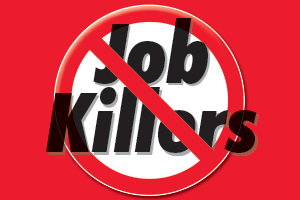 Two job killer bills that will increase costs and expose employers to potential litigation will be considered by the Assembly Labor and Employment Committee on Wednesday.
Two job killer bills that will increase costs and expose employers to potential litigation will be considered by the Assembly Labor and Employment Committee on Wednesday.
SB 1383 (Jackson; D-Santa Barbara) significantly burdens small employers by requiring small employers with only five employees to provide eligible employees with 12 weeks of mandatory family leave, which can be taken in increments of 1-2 hours, and threatens these small employers with costly litigation if they make any mistake in implementing this leave.
SB 1399 (Durazo; D-Los Angeles) significantly increases the burden on non-unionized employers in the garment manufacturing industry in California by eliminating piece rate as a method of payment even though it can benefit the employee, creating joint and several liability for contractors for any wage violations or the employer, and shifting the evidentiary standards in a Labor Commissioner hearing to limit the ability for an employer to defend against an alleged wage violation. These additional requirements will encourage companies to contract with manufacturers outside of California, thereby limiting the demand and workforce of garment manufacturers in California.
SB 1383
Due to the COVID-19 pandemic, SB 1383 significantly burdens employers at a time when they are struggling to reopen and rebuild.
“It’s happening when businesses can least afford it and presents a particular burden to small businesses by lowering the threshold from 50 to five,” CalChamber Executive Vice President Jennifer Barrera told the Northern California Record in an interview last week. “There’s no question we’re in an economic crisis due to the coronavirus, and the governor on Monday [July 13] shutting down businesses again adds to their very precarious position. This bill is one more obstacle on their ability to maintain their operations.”
The leave of absence established by SB 1383 will increase costs on employers, and will disproportionally impact small businesses.
A study conducted on California’s six-week Paid Family Leave program in 2011 by Eileen Applebaum and Ruth Milkman found that very small businesses face special challenges when filling in for absent workers due to their small size and the lack of co-workers available to cover work.
Even though the leave required in SB 1383 is not “paid” by the employer, that does not mean the employer will not endure added costs. The leave is “protected,” meaning an employer must return the employee to the same position the employee had before going out on leave, and means that employers must hold a position open for three months or more.
While an employer can temporarily fill the position with a new employee, that replacement usually comes at a premium. Replacement employees know they are short term and, therefore, require a premium wage, are less dedicated to the position, and often leave for a better opportunity at a moment’s notice. Also, many jobs require extensive amounts of time and money to train a new employee, adding another cost. Some employers shift the work to other existing employees, which often leads to overtime pay. And, most leaves of absence require employers to maintain health benefits while the employee is out.
SB 1383 also imposes a significant administrative burden—it is not as simple as counting out 12 weeks on a calendar and providing that time off. For medical conditions, employees can take the leave in increments as small as one to two hours at a time, and an employee is only required to provide an employer with “reasonable notice,” which is subjective and can literally be minutes before a shift begins—leaving an employer with a limited number of workers in a challenging situation.
Additionally, an employer must track the time off as California Family Rights Act (CFRA) leave or it may not count against the 12 weeks provided by the leave. Retroactively designating leave as “CFRA” is a risky employment practice that could lead to litigation.
Lastly, this new 12-week leave of absence on small employers cannot be viewed in isolation, but must be considered with regard to the numerous California-specific leaves already in place that employers must juggle, the CalChamber stresses.
SB 1399
SB 1399 places enormous burdens on non-unionized employers in the clothing industry, punitive enforcement measures, and unrealistic bond requirements. The bill, the CalChamber warns, will put employers in this industry, who are already suffering from the financial crisis of this pandemic, out of business.
The bill imposes significant burdens and liability onto any employer or contractor in the garment manufacturing industry, including a new category of companies defined as “brand guarantors,” which basically includes any person or entity in the clothing industry, including dry cleaners, small and large retailers, secondhand retailers, personal shoppers, online personal shoppers, and more. Interestingly, SB 1399 provides a blanket exemption to nearly all of these laws if employees are covered by a “bona fide collective bargaining agreement.” If these proposed changes are appropriate for non-unionized workforces, then they should be appropriate for unionized workforces too, the CalChamber argues.
Also problematic is that SB 1399 imposes joint and several liability on any company that contracts with another person for the performance of garment manufacturing or who contracts with a “brand guarantor” as defined, for the minimum wages, overtime, break premiums, liquidated damages, penalties, attorney fees, and workers’ compensation coverage. Essentially, any person or entity that contracts in the apparel industry could be on the hook and liable for the wage and hour violations, penalties, attorney fees, etc., even though that person or entity exercised no control over the workers.
AB 5 (Gonzalez; D-San Diego), which was signed into law last year, has already had a chilling effect on contracting in the California economy. SB 1399 will eliminate contracting in the apparel industry in California, as no company will take on the potential liability of having to pay for wage and hour violations it did not commit or paying the attorney fees for another company’s litigation, the CalChamber points out.
Lastly, by amending the Labor Code, SB 1399 also significantly expands the representative actions that can be pursued through Labor Code Private Attorneys General Act (PAGA), expanding the threat of litigation on employers when they can least afford it.
Staff Contact: Jennifer Barrera


